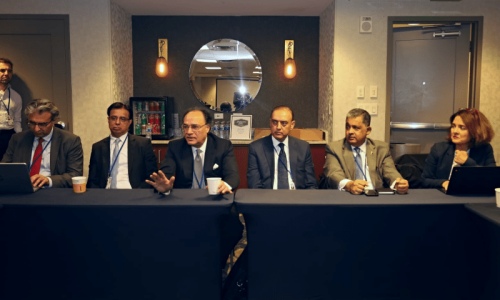US : Washington to attend the World Bank and IMF
• Aurangzeb hopes to obtain additional funding from the IMF’s climate resilience fund
• At the SBP meeting, hints at a decrease in the benchmark rate China’s initial response to Pakistan’s request for extended debt maturities in connection with the Belt and Road Initiative was positive and encouraging, according to Finance Minister Muhammad Aurangzeb.
Mr. Aurangzeb suggested, in interviews with the media in the United States and at events hosted by think tanks, that Pakistan might be able to manage its debt more easily as a result of its past borrowing. As stipulated by the most recent $7 billion loan agreement with the International Monetary Fund (IMF), he emphasized the need for extensive structural reforms.
Mr. Aurangzeb is currently in Washington to attend the World Bank and IMF annual meetings. He has also held bilateral discussions with US officials and allied finance ministers during his visit.
Mr. Aurangzeb prioritized broadening the tax base, reforming the energy sector, and privatizing State-Owned Enterprises (SEOs) at an event hosted by IMF Director for the Middle East and Central Asia Jihad Azour.
In an interview with Bloomberg, the finance minister talked about efforts to “create enough space” for lowering electricity costs by extending the maturities of power plant-related debt. He mentioned that the cost of electricity had already skyrocketed, surpassing the cost of housing for some residents. He stated that negotiations were still in their infancy and that they had just begun. “The response is encouraging. During a visit to China in July, he had previously addressed the issue.
The Pakistani delegation emphasized that the country had entered a phase of relative stability following the approval of the new $7 billion IMF program during meetings with financial experts, lenders, and bankers. In addition, they mentioned that China had rolled over $16 billion of the approximately $26 billion in debt that was due for this fiscal year, which began in July.
The money serve informed Bloomberg that Pakistan should keep up with financial discipline to build the duty to-Gross domestic product proportion from under 10% to 13.5pc, fully intent on diminishing future reliance on IMF advances. Pakistan is one of the IMF’s most frequent borrowers, having participated in 25 programs so far.
During his visit to Washington, Mr. Aurangzeb stated that he hoped to obtain additional funding from the IMF’s climate resiliency fund rather than applying for new loans. He also talked about the economic stabilization measures the government is taking. He said that the State Bank of Pakistan has cut its benchmark interest rate by 450 basis points in three meetings, from 22 percent to 17.5 percent. He gave the impression that the SBP meeting on November 4 might result in yet another rate cut.
Along with finance ministers, central bank governors, and leaders of regional financial institutions from the Middle East and North Africa, he also attended a meeting with the Managing Director of the IMF. He demanded more funding for climate resilience and emphasized the inclusion of social protection measures in IMF lending frameworks.
The finance minister advocated for more debt relief mechanisms and concessional financing for vulnerable nations during these meetings. He also supported the review of the Low-Income Countries Debt Sustainability Framework (LIC-DSF) incorporating difficulties like climate risks, domestic public debt, and complex debt restructuring.
Mr. Aurangzeb credited the IMF’s successful stand-by arrangement for Pakistan’s favorable economic indicators at a roundtable discussion with institutional investors hosted by Jefferies International. He outlined the government’s reform priorities, with an emphasis on increasing the tax-to-GDP ratio, reducing losses in the energy sector, enhancing governance in State-Owned Enterprises (SOEs), speeding up privatization, and limiting spending by reducing the size of the federal government.
Mr. Aurangzeb thanked the United States for their assistance in securing Pakistan’s IMF Extended Fund Facility and briefed US Assistant Secretary for the Treasury Brent Nieman on important reforms in a subsequent meeting.
Mr. Aurangzeb emphasized the need to “fix our energy equation” and broaden the tax net to include sectors that are currently not taxed or undertaxed at the Wilson Center in Washington. He warned, “Unless” these reforms are implemented, “We cannot get onto a sustainable growth path.”
Additionally, he called for a change in the economic model, stating: Our economy’s DNA has always been import-led and import-dependent, which is why we have had so many boom and bust cycles. We must shift the economy’s DNA toward export-driven growth.



